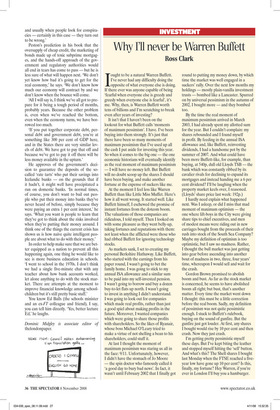Why I’ll never be Warren Buffett
Ross Clark
Iought to be a natural Warren Buffett. I’ve never had any difficulty doing the opposite of what everyone else is doing. If there ever was anyone capable of being ‘fearful when everyone else is greedy and greedy when everyone else is fearful’, it’s me. Why, then, is Warren Buffett worth tens of billions and I’m scratching to break even after years of investing?
It isn’t that I haven’t been on the lookout for what Buffett calls ‘moments of maximum pessimism’. I have. I’ve been buying into them strongly. It’s just that there have been so many moments of maximum pessimism that I’ve used up all the cash I put aside for investing this year. So when it comes to the big one — the one economic historians will eventually identify as the real moment of maximum pessimism — I will have no money left. But Buffett will no doubt scoop up the shares I should have been buying, and make another fortune at the expense of suckers like me.
At the moment I feel less like Warren Buffett than like Little Miss Muffet. Here’s how it all went wrong. It started well. Like Buffett himself, I eschewed the promise of instant fortunes from the dotcom boom. The valuations of those companies are ridiculous, I told myself. Then I looked on with some pleasure as they went belly-up, taking fortunes and reputations with them: not least when the afflicted were those who had ribbed Buffett for ignoring technology stocks.
As markets sank, I set to creating my personal Berkshire Hathaway. Like Buffett, who started with the earnings from his paper round, I wasn’t going to bet the family home. I was going to stick to my annual ISA allowance and a similar sum to be paid into my self-invested pension. I wasn’t going to borrow and buy a dozen buy-to-let flats up north. I wasn’t going to invest in anything I didn’t understand. I was going to look out for companies which made real profits, rather than just a good spiel about making profits in the future. Moreover, I wanted companies which were going to share those profits with shareholders. So the likes of Ryanair, whose boss Michael O’Leary tried to make a virtue of not shelling a bean to his shareholders, could stuff it.
At last I thought the moment of maximum pessimism was staring us all in the face: 9/11. Unfortunately, however, I didn’t have the stomach of Jo Moore — the spin doctor who famously called it ‘a good day to bury bad news’. In fact, it wasn’t until February 2002 that I finally got round to putting my money down, by which time the market was well engaged in a suckers’ rally. Over the next few months my holdings — mostly plain-vanilla investment trusts — bombed like a Lancaster. Spurred on by universal pessimism in the autumn of 2002, I bought more — and they bombed too.
By the time the real moment of maximum pessimism arrived in March 2003, I had already spent my allotted sum for the year. But I couldn’t complain: my shares rebounded and I found myself in profit. By feeding in the annual ISA allowance and, like Buffett, reinvesting dividends, I had a handsome pot by the summer of 2007. And what could have been more Buffett-like, for example, than buying, at 540p, dull old Lloyds TSB — the bank which was constantly ribbed by its cavalier rivals for declining to expand its mortgages and instead handing me a 6 per cent dividend? I’ll be laughing when the property market keels over, I reasoned. (Lloyds’ share price last week: 192p.) I hardly need explain what happened next. Was I asleep, or did I miss that mad moment of maximum optimism — the one where lift-boys in the City were giving share tips to chief executives, and men of modest means were riding out in new carriages bought from the proceeds of their rush into stock of the South Sea Company? Maybe my definition of optimism is too optimistic, but I saw no madness. Rather, I thought the bull market was just getting into gear before ascending into another bout of madness in two, three, four years’ time, whereupon I would sell and wait for the crash.
Gordon Brown promised to abolish boom and bust. As far as the stock market is concerned, he seems to have abolished boom all right; but bust, that’s another matter. Every time the market went down I thought: this must be a little correction before the real boom. Sadly, my definition of pessimism was not quite pessimistic enough. I stuck to Buffett’s rulebook, buying on the sound of gunfire. But the gunfire just got louder. At first, any shares I bought would rise by 10 per cent and then crash. Now they just crash.
I’m getting pretty pessimistic myself these days. But I’ve kept biting the leather and stopped myself hitting the ‘sell’ button. And what’s this? The Shell shares I bought last Monday when the FTSE reached a fiveyear low have gone up 10 per cent? Is this, finally, my fortune? Hey Warren, if you’re ever in London I’ll buy you a hamburger.


















































































 Previous page
Previous page